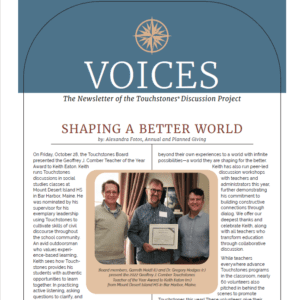By The Touchstones Roving Reporter
Howard Zeiderman, co-founder and President of the Touchstones® Discussion Project, sat down with me to talk about 35 years with Touchstones and provide a look at the future.
Reporter: What led you, Geoff Comber, and Nick Maistrellis to start work on the Touchstones Project, as it was initially known in the 1980’s?
Zeiderman: Geoff was invited to model seminars at a high school in
Hartford and asked if I’d go with him. I’d taught in the Graduate Institute at
St. John’s College and had met Geoff there. We assumed we’d run our
classes in Hartford like we did at St. John’s. He was going to run an English
class and I was going to run a Math class. Unfortunately, what we saw was
typical in a lower-performing school: students hadn’t prepared. I had to
create the class on the spot. I ended up reading the texts aloud to the students, and there was a lot of initial confusion. By the end of class, though, students were at the board working together. When we looked at video afterward, we saw a Touchstones class starting to take shape. In one period, something extraordinary had happened. Many students participated, listened to one another, and by the end, students were starting to assume leadership in their discussion. We knew we were on to something.

Howard Zeiderman (right), leads a Touchstones workshop in Amman, Jordan in 2010 with Abeer Ammouri from the Ministry of Education and teachers from the Arabic curriculum.
Reporter: Did you expect Touchstones’ work in schools to also appeal to adults?
Zeiderman: I did, in fact. The Project was created for all people. It became a
school project because all people go to school. We wanted to reach everyone
as early as possible. I think people of all ages, backgrounds, and cultures
face the same problems, as we’ve moved into a world that’s very different
from what we inherited. We all need to learn to collaborate with each
other and share leadership—whether we’re talking about a classroom of
young students or a corporate team. Touchstones gives everyone a voice,
which enables people to be recognized as individuals as well as to be
part of a group.
Reporter: What are some highlights of your work with Touchstones?
Zeiderman: I think the most important part of this has been to see how
similar people are from different cultures and work environments and that everybody has talents. I was struck in our work in Jordan by how a group that initially seemed so different was immediately able to apply their strengths in a new environment. They began sharing responsibility for the success of their discussions and started practicing self-governance, which meant they were less dependent on particular leaders for finding answers to hard questions.
Reporter: You’ve served as Touchstones’ President since the mid- 2000’s and are moving into a new role at the end of this year. What do you expect that change will be like?
Zeiderman: I won’t be involved in the day-to-day management and schools.
My focus will shift to organizations and institutions—work I’ve done for
decades but haven’t done exclusively. I’ll be designing programs for groups
of executives in organizations to address specific problems —things like leadership development, communication, and overcoming barriers to inclusive collaboration. I’m putting together a team of executives and leaders to implement these projects with me and looking forward to working
with them.
Reporter: What’s your greatest hope for Touchstones in the future?
Zeiderman: My hope is that the Project becomes the central piece of our national approach to education. Our country needs students whose attitudes and skills are developed in ways that support all aspects of life. Touchstones makes this possible.



 Join the
Join the